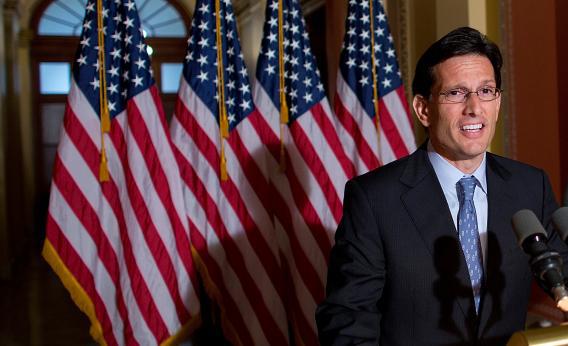Read the rest of Slate’s coverage on the Supreme Court upholding the Affordable Care Act.
I took a break from my usual habits and watched Morning Joe this morning (an interesting reminder, incidentally, that “liberal” MSNBC dedicates hours of programming every day to conservative punditry shows) and House Majority Leader Eric Cantor was on, explaining that if Republicans win in November, they’ll repeal the Affordable Care Act. Tom Brokaw said no way because of the filibuster. Cantor said Democrats passed the bill under reconciliation orders, so Republicans will unpass it under the same. Ryan Lizza thinks this won’t work (h/t Mickey Kaus) for reasons I find unconvincing:
Many Republicans, especially in the blog and talk-radio swamps, would cry, “Use reconciliation!” Readers familiar with the congressional debates of 2009-2010 will remember that this procedure allows certain budgetary measures to pass through the Senate with a simple majority. (After Ted Kennedy died and was replaced by the Republican Scott Brown, Obama and congressional Democrats used the reconciliation process to make some final, crucial changes to the health-care law.) But reconciliation wouldn’t work here—the process can only be used for policies that have budgetary effects and a C.B.O. score. Much of the A.C.A., such as the insurance exchanges and subsidies, would fall under these categories. But a lot of it, including the hated individual mandate, does not. Repealing the exchanges and subsides without repealing the mandate and the other regulations and cost controls in the law would create a health-care Frankenstein that a President Romney would be rather nuts to support.
What I think this misses is that in the real world there are very few practical constraints on reconciliation. The operational issue the Obama administration had with reconciliation is that there were a clutch of 10-15 Democratic senators who preferred a 60-vote Senate because it shifted the pivot point and put policy outcomes closer to their personal ideal points. It was those senators who raised a lot of niggling objections about reconciliation rules.
The GOP is more ideologically unified and more focused on advancing a broad conception of the national interest rather than parochial concerns of individual legislators. Here’s how they handled the reconciliation process last time Democrats attempted to filibuster a major legislative priority:
The senate parliamentarian serves as arbiter of the Senate’s rules. Although the vote of 60 senators can overrule the parliamentarian’s decision, that seldom happens. What drew Lott’s ire were the parliamentarian’s decisions that made it easier for Democrats to stall the president’s tax and budget bills. (Senate rules generally prevent filibusters on budget and tax bills. And the GOP leadership wanted those rules interpreted as broadly as possible. But Dove didn’t always comply. Earlier he ruled that only one tax bill a year could be immune to a filibuster. And more recently, he ruled that a disaster relief set aside also wouldn’t be getting the no-filibuster free ride.) Desiring more accommodating decisions, he fired Dove.
That is how you get things done in Washington when you want to get things done. And my view is that Republicans, at this point, really do want to repeal the Affordable Care Act. They don’t like that it raises taxes, they don’t like that it spends money on the poor, they don’t like that it rolls back Medicare privatization, and they don’t like that it pushes health insurance companies in the direction of becoming regulated utilities. If they genuinely lack the votes for repeal, they won’t repeal it, but they’re not going to let interpretive disputes over what is and isn’t a budgetary measure hold them up.
